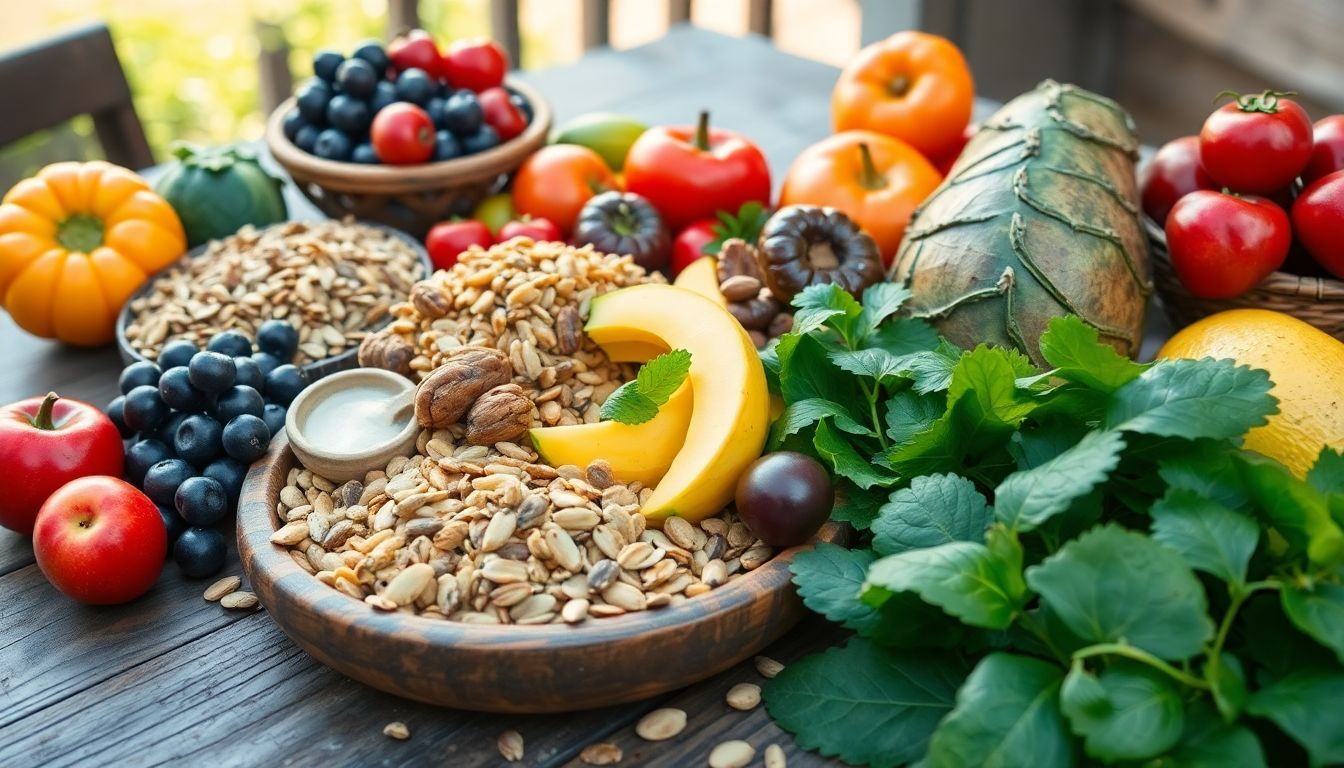Feeling forgetful or struggling with focus? Your diet might play a bigger role in brain health than you think. Certain foods, like fatty fish and dark chocolate, can improve memory and help fight cognitive decline.
Thank you for reading this post, don't forget to subscribe!Keep reading to discover how what you eat can boost your brainpower!
Key Takeaways
- Oily fish like salmon and sardines are rich in omega-3 fatty acids, which improve memory, blood flow to the brain, and reduce cognitive decline risks. Eating two servings weekly is recommended.
- Dark chocolate with at least 70% cacao contains antioxidants that enhance focus, boost mood, and fight oxidative stress. Avoid processed options with added sugar.
- Berries like blueberries and strawberries contain antioxidants that protect brain cells, delay mental decline, and support memory improvement by reducing inflammation.
- Whole grains provide slow-releasing energy for better focus. They contain B vitamins essential for maintaining cognitive function and preventing age-related decline.
- Foods like nuts (walnuts) and seeds (pumpkin seeds) supply healthy fats, vitamin E, zinc, and antioxidants to protect the brain from damage while improving neuron communication over time.
Top Brain-Boosting Foods

What you eat can impact how your brain works. Certain foods may help sharpen memory, support focus, and protect against cognitive decline.
Oily Fish
Salmon, mackerel, tuna, sardines, and herring are rich in omega-3 fatty acids. These healthy fats support brain function and protect against cognitive decline. A 2017 study showed higher omega-3 levels improve blood flow to the brain and boost mental performance.
Oily fish may help with memory improvement. Alzheimer’s disease patients have shown better cognitive function with more omega-3 intake. Eating fatty fish twice a week is an easy way to include these benefits in your diet.
Omega-3s are vital for brain health and aging gracefully.
Dark Chocolate
Dark chocolate packs a punch for brain health. It contains flavonoid antioxidants that fight oxidative stress and may enhance cognitive function. Cacao boosts blood flow to the brain, improving memory and focus.
Regular intake can also reduce depressive symptoms, promoting emotional well-being.
Products like Navitas Organics Cacao Powder or Cacao Nibs offer easy ways to add dark chocolate benefits to your diet. Aim for at least 70% cacao content for maximum impact. Skip processed options with added sugars—stick with pure, minimally-processed products instead.
Berries
Berries are full of antioxidants that fight free radicals in the body. Blueberries, for example, contain anthocyanins which improve brain cell communication. A 2014 review revealed berries can delay cognitive decline and support memory improvement.
These small fruits also boost brain function by reducing inflammation. Compounds in strawberries or blackberries may protect against neurodegenerative disorders like Alzheimer’s disease.
Adding a handful to your healthy diet is an easy step toward better brain health!
Nuts and Seeds
Nuts and seeds pack a punch for brain health. Walnuts, almonds, and peanuts deliver protein and omega fatty acids that help neurons communicate better. Pumpkin seeds supply zinc for sharper memory and thought processing.
Sunflower seeds provide vitamin E, which fights age-related cognitive decline.
Almonds may boost memory, while pistachios protect healthy fats in the brain from inflammation. Macadamias aid normal brain function by supporting healthy fat levels. A handful daily can improve cognitive function over time—small snack, big benefits!
Pumpkin seeds are nature’s tiny powerhouses—loaded with zinc to support your mind.
Whole Grains
Whole grains, like brown rice and whole wheat bread, fuel your brain. They provide complex carbohydrates that release energy slowly—keeping you focused longer. These carbs help maintain steady blood sugar levels, crucial for brain function and memory improvement.
Whole grains also contain B vitamins, which support cognitive function and reduce cognitive decline.
Mediterranean diets include whole grains due to their link with better brain health. The MIND diet, known for slowing brain aging, recommends them too. Eating more oats or quinoa can improve blood flow to the brain over time.
Small changes, such as switching to whole-grain pasta or cereal, can boost learning ability and protect against neurodegenerative disorders like Alzheimer’s disease.
Nutrients That Support Brain Health
Certain nutrients can improve how your brain works and even protect it from harm. These include vitamins, healthy fats, and antioxidants that fight damage caused by harmful molecules.
Omega-3 Fatty Acids
Omega-3 fatty acids support brain health by improving cognitive function and reducing the risk of cognitive decline. These healthy fats are found in fatty fish like salmon, mackerel, and sardines.
Experts recommend eating about eight ounces of omega-3-rich fish weekly—roughly two servings. Plant-based options include chia seeds, flax seeds, walnuts, and sesame seeds.
These essential fats make up cell membranes in the brain. They also help prevent neurodegenerative diseases like Alzheimer’s disease. Omega-3s improve blood flow to the brain, which aids memory retention and focus.
Adding these foods to your diet promotes stronger mental clarity over time!
Antioxidants
Antioxidants fight free radicals in your body. These harmful molecules can speed up aging and damage brain cells. Fruits like blueberries, apples, and tomatoes are rich in these nutrients.
Leafy greens also protect the brain from cognitive decline. Studies show they slow age-related mental decline by nearly 40%.
Dark chocolate is another great source of antioxidants—flavonoids found in it may improve memory and focus. Green tea offers similar benefits, helping reduce brain fog. These foods reduce risks tied to Alzheimer’s disease and Parkinson’s disease while boosting overall brain health.
Omega-3 fatty acids also play a huge role in supporting memory care.
B Vitamins
B vitamins like B6, B9 (folate), and B12 help keep your brain sharp. They support energy production, DNA repair, and neurochemical balance. Studies like Smith et al. (2010) show these vitamins can slow brain atrophy in people with mild cognitive impairment.
Folate deficiency is common in many countries and may affect memory or cognitive function. Leafy greens like spinach, soy products, sunflower seeds, whole grains, and brown rice are rich in B Vitamins.
These foods promote better brain health while helping to lower the chances of issues like cognitive decline or Alzheimer’s disease over time.
Can You Grow New Brain Cells? The Truth About Neurogenesis
The brain can grow new cells. This process is called neurogenesis. For years, scientists thought the adult brain couldn’t do this. But research shows it’s possible, even in older adults.
New neurons form in parts of the brain like the hippocampus, which handles memory and learning. This means practices that support neurogenesis might improve memory and help stop cognitive decline.
Certain foods and habits may encourage neurogenesis. For example, omega-3 fatty acids found in oily fish are linked to better brain health. Some studies also suggest caffeine boosts thinking by increasing “brain entropy,” or how flexibly your mind processes information.
Regular exercise helps too—it increases blood flow to the brain and supports neuron growth. These small lifestyle changes aim to protect you from conditions like Alzheimer’s disease while boosting mental sharpness over time!
Tips for Incorporating Brain-Boosting Foods into Your Diet
Including brain-boosting foods in your meals can improve brain function and overall health. Small changes make a big difference.
- Add oily fish like salmon to your meals twice a week. They are rich in omega-3 fatty acids, which support cognitive function and brain health.
- Snack on nuts and seeds such as almonds, sunflower seeds, or pumpkin seeds. These provide healthy fats, vitamin E, and antioxidants that protect the brain from free radicals.
- Swap white bread for whole grains like brown rice or quinoa. Whole grains offer complex carbohydrates that ensure steady blood flow to the brain.
- Include leafy greens like bok choy in your salads or soups for vitamin K, which is linked to better memory improvement.
- Use olive oil instead of butter when cooking. Olive oil provides unsaturated fats that are better for preventing cognitive decline and heart disease compared to saturated fats found in fried foods or red meat.
- Enjoy a small piece of dark chocolate as an afternoon treat—it contains antioxidants that may help reduce brain fog and boost mood.
- Drink green tea during your breaks for its high vitamin C content, antioxidants, and ability to improve alertness without weight gain risks tied to sugary drinks.
- Follow eating guides like the Mediterranean diet or DASH diet that emphasize plant-based foods, lean proteins, and cutting back on processed foods.
Conclusion
Eating brain-boosting foods can improve your cognitive function and overall health. Healthy fats, omega-3s, and antioxidants play key roles in keeping the brain sharp. Small diet changes—like adding berries or whole grains—can help protect against cognitive decline.
It’s never too late to make smarter food choices for better brain health! Start today with simple swaps for a clearer mind tomorrow.
Discover the fascinating process of how our brains can regenerate and grow new cells in our detailed article, “The Truth About Neurogenesis: Can You Really Grow New Brain Cells?“
References
- https://www.uclahealth.org/news/article/diet-rich-in-fatty-fish-good-for-cognitive-function (2022-02-28)
- https://pmc.ncbi.nlm.nih.gov/articles/PMC9641984/
- https://navitasorganics.com/blogs/navitaslife/cacao-for-brain-health?srsltid=AfmBOoqaSLoMEfxTcV5AekgRth4CJYgi1QV37GZr6ZSCMdpoOlPwSaro
- https://www.healthline.com/nutrition/11-brain-foods
- https://www.tomahhealth.org/wellness/5-foods-that-are-proven-to-improve-brain-health/
- https://www.nm.org/healthbeat/healthy-tips/nutrition/best-food-for-a-healthy-brain
- https://health.clevelandclinic.org/foods-that-improve-memory (2022-05-18)
- https://pmc.ncbi.nlm.nih.gov/articles/PMC10334137/
- https://www.cnbc.com/2024/04/25/harvard-nutritionist-the-no-1-nutrient-you-need-for-a-healthy-brain.html (2024-04-25)
- https://www.piedmont.org/living-real-change/foods-that-boost-brain-function
- https://www.cchwyo.org/news/2025/february/foods-to-keep-your-brain-healthy-a-nutrient-pack/
- https://pmc.ncbi.nlm.nih.gov/articles/PMC4772032/
- https://www.health.harvard.edu/mind-and-mood/can-you-grow-new-brain-cells
- https://www.mayoclinichealthsystem.org/hometown-health/speaking-of-health/5-tips-to-keep-your-brain-healthy (2022-12-29)
- https://www.health.harvard.edu/healthbeat/foods-linked-to-better-brainpower
